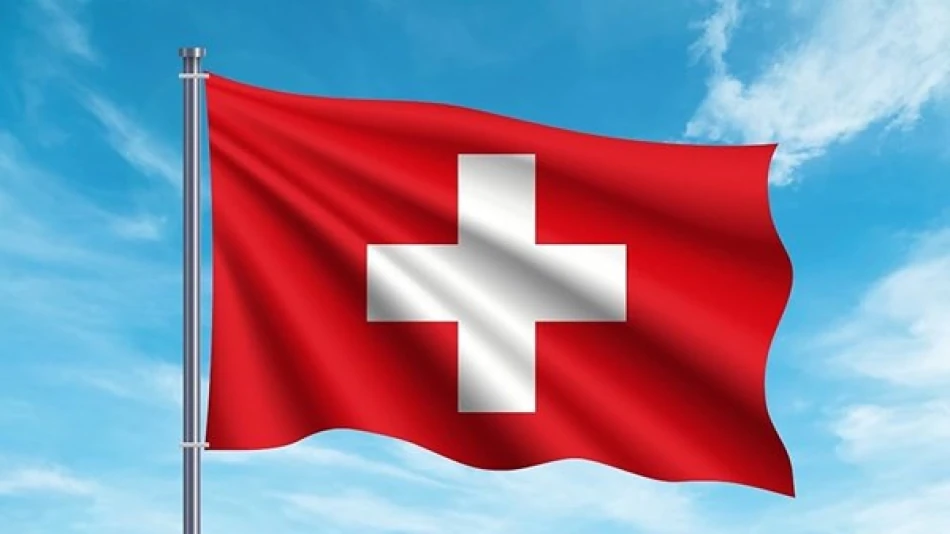
Switzerland Holds Trade Talks with US in Washington: Exploring Bilateral Economic Opportunities
Switzerland's President Races to Washington as 39% US Tariffs Loom
Swiss President Karin Keller-Sutter is making an emergency diplomatic dash to Washington, meeting with Secretary of State Marco Rubio today in a last-ditch effort to secure exemptions from punitive 39% tariffs set to hit Swiss exports tomorrow. The high-stakes negotiations underscore how quickly trade relations can deteriorate and force even traditionally neutral nations into urgent damage control.
Eleventh-Hour Diplomacy as Economic Pressure Mounts
Keller-Sutter, accompanied by Economics Minister Guy Parmelin, arrived in Washington for what amounts to emergency trade talks just 24 hours before the tariffs take effect Thursday. The 39% levy represents one of the steepest trade penalties imposed on a developed economy in recent years, potentially devastating Swiss exporters who have built their competitiveness around precision manufacturing and luxury goods.
The timing reveals the severity of the situation. Switzerland rarely engages in such visible, urgent diplomacy, preferring measured, behind-the-scenes negotiations. That both the president and economics minister traveled personally signals Bern views this as an economic crisis requiring the highest level of intervention.
What's at Stake for Swiss Industry
Switzerland exported approximately $18.6 billion worth of goods to the United States in 2023, making America its third-largest trading partner after Germany and China. A 39% tariff would effectively price many Swiss products out of American markets, particularly impacting:
Precision Manufacturing and Pharmaceuticals
Swiss pharmaceutical giants like Novartis and Roche, along with precision instrument makers, face potential supply chain disruptions. Unlike luxury watches where consumers might absorb higher costs, industrial components and generic drugs operate on thinner margins where a 39% tariff could eliminate competitiveness entirely.
Financial Services Spillover
While services aren't directly tariffed, Swiss banks and asset managers with significant US operations could face regulatory scrutiny if trade tensions escalate. Switzerland's banking sector has spent decades rebuilding relationships with US authorities following tax evasion scandals.
Limited Precedent for Success
Historical precedent offers little comfort for Swiss negotiators. When the Trump administration imposed steel and aluminum tariffs in 2018, few countries secured meaningful exemptions without offering substantial concessions. Canada and Mexico gained relief primarily through NAFTA renegotiations, while the EU endured months of uncertainty.
Switzerland's challenge is particularly acute because it lacks the economic leverage of larger trading blocs. The country cannot threaten retaliatory tariffs on US agricultural exports or technology services at a scale that would meaningfully impact American interests.
Market Implications and Investor Outlook
Swiss equity markets have already begun pricing in potential disruption, with export-heavy stocks underperforming broader European indices this week. The Swiss franc has weakened against the dollar as currency traders anticipate reduced export competitiveness.
For multinational corporations, the tariffs could accelerate existing trends toward supply chain regionalization. Swiss companies may need to consider relocating production closer to end markets, potentially reducing Switzerland's role as a manufacturing hub for global exports.
Beyond Immediate Crisis Management
Even if Keller-Sutter secures temporary relief, the episode highlights Switzerland's vulnerability in an era of weaponized trade policy. The country's traditional neutrality offers little protection when economic nationalism drives policy decisions.
The outcome of Wednesday's meetings will likely influence how other mid-sized economies approach similar challenges. Success could provide a template for urgent diplomatic intervention, while failure might signal that even America's closest allies must prepare for prolonged trade uncertainty in the current global environment.
Most Viewed News

 Layla Al Mansoori
Layla Al Mansoori






